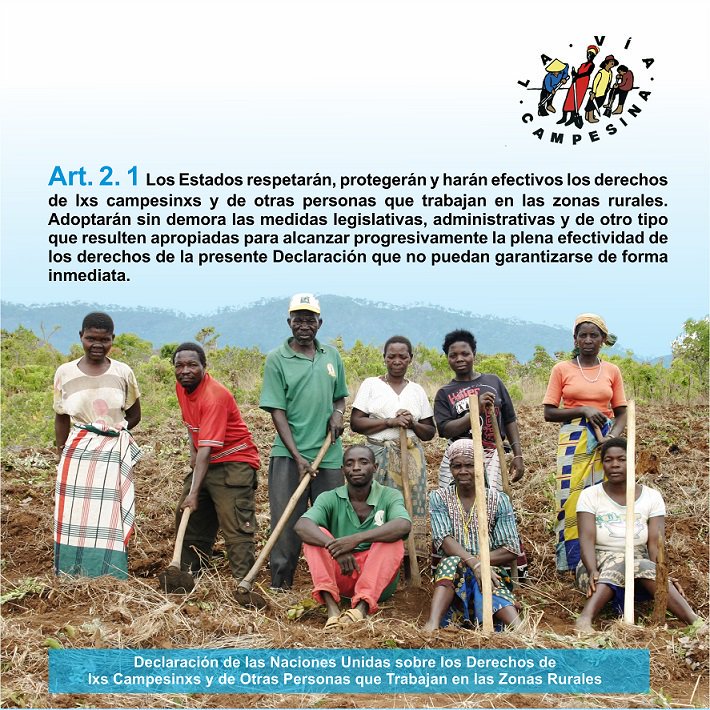In December the United Nations General Assembly approved the Declaration, which raises the visibility of peasants’ role in the fight against hunger and the protection of nature and recognizes rights that must be protected by states. This achievement is the product of nearly ten years of work by the international peasant movement. In 2008, La Via Campesina presented its Declaration on the rights of peasant men and women, and the process before the UN Human Rights Council began in 2010. Since 2012, when the working group charged with drafting the declaration was created, CELS has followed the discussions and negotiations, along with CLOC-Vía Campesina.
The Declaration underlines that peasants are especially affected by hunger, malnutrition and poverty and by the consequences of environmental degradation and climate change. It also indicates that they are frequently denied tenure and ownership of land as well as equal access to productive resources, financial services, information, employment and social protection. Forced displacements and migration are other problems that especially impact this population.
With regard to the right to land, the Declaration establishes that “peasants and other people living in rural areas have the right to land, individually and/or collectively” and that it is the role of the state “to limit excessive concentration and control of land.” It specifically establishes that states must ensure the social function of land and adopt appropriate measures to legally recognize the rights of tenure over the land, among them “agrarian reforms in order to facilitate the broad and equitable access to land and other natural resources necessary to ensure that peasants and other people working in rural areas enjoy adequate living conditions.” In addition, in an article that is greatly relevant to people who face major difficulties in regularizing the ownership of lands on which they have lived and worked ancestrally – such as occurs in Argentina – the Declaration establishes that “States shall prohibit arbitrary and unlawful forced eviction, the destruction of agricultural areas and the confiscation or expropriation of land and other natural resources.”
With regard to seeds, the Declaration recognizes peasants’ right to save, use, exchange and sell their own seeds and to maintain, control and develop their own knowledge about them. In this sense, states must adopt measures to sustain such seed systems and promote their use and biodiversity. It also establishes that “States shall ensure that seed policies, plant variety protection and other intellectual property laws, certification schemes and seed marketing laws respect and take into account the rights, needs and realities of peasants and other people working in rural areas.”
In addition, the Declaration recognizes the right of peasants to access justice both for conflict resolution as well as for the investigation and sanction of human rights violations. More specifically, it stipulates that “States shall provide peasants and other people working in rural areas with effective mechanisms for the prevention of and redress for any action that has the aim or effect of violating their human rights, arbitrarily dispossessing them of their land and natural resources or of depriving them of their means of subsistence and integrity.”

